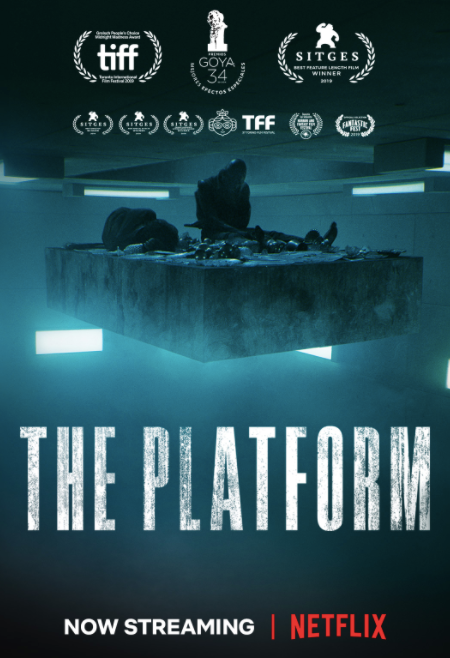
Parables come in all kinds of platforms. The Platform, a Spanish film with English subtitles now on Netflix, is a story about the essence of humanity tested to its very limits. That’s a worthy parable, to say the least. Unfortunately, this movie’s unique way of telling it is disgusting, in the literal sense of that word. The question is: was that kind of stomach-turning story necessary to convey such a crucial message?
The story features Goreng, who finds himself in a "Vertical Self-Management Center,” a tower with hundreds of levels, in which a big feast of a platter is prepared and sent down, level by level, allowing the two people in each cell it reaches to consume as much as they can in a short period of time. Such a set-up allows the people on the higher levels to eat more and much better than the people below them, who are left with successively fewer scraps until there’s nothing on the platter other than empty plates and the longing, furious stares of hungry people. Further, to make matters even more interesting, the inmates, or whatever exactly they are, are sent to higher or lower levels each month, for whatever random reason.
At this point, although watching people stuff their mouths with food is no pleasure to watch, I wouldn’t call The Platform disgusting. But it soon takes a turn which, though logical enough, is certainly physically revolting. When food on the platter is non-existent, there’s always cannibalism. We see this more than once, in blood-dripping detail.
After a series of unsuccessful ventures in moral persuasion – such as trying to convince the people on the upper levels to forego a meal so that the people on the lower levels have a crumb or more to eat – Goreng teams up with Baharat, and together they plan a way of getting the administration of this mostly involuntary hotel to see the error of their system. The two awake one month on a very high level, and a pristine panna cotta is on the platter they receive. If they jump onto the platform with the platter, and take it all the way down to the bottom level, then back up to the top, with the panna cotta uneaten, they can show the administration that the human beings in the tower have self-restraint, and don’t deserve to be treated like animals. Indeed, apropos Marshall McLuhan’s “The medium is the message,” the two voyagers come up with and repeat the mantra that “The panna is the message.”
I won’t tell you the specifics of the very end, except that the mantra changes, and I’m not sure that the new mantra works as well as the panna in this parable. The shift in metaphor feels a little heavy handed. As did the depicted cannibalism and other gross activities that were in one way or another related to food. The movie at least was leavened in places with a little humor – as when Goreng says to a woman who brings her sausage dog with her, “In here, he’s more a sausage than a dog.” My advice: a bit more humor, a lot less gore, would have made this parable more effective. Not that a parable has to be effortlessly palatable to make its point, but it needn’t make you gag.
reviewing Black Doves; Cross; Dark Matter; Dept. Q; Dexter: Original Sin, Resurrection; Dune: Prophecy; For All Mankind; Foundation; Hijack; MobLand; Outlander; Presumed Innocent; Prime Target; Severance; Silo; Slow Horses; Smoke; Star Trek: Strange New Worlds; Stranger Things; The: Day of the Jackal, Diplomat, Last of Us, Way Home; Your Friends and Neighbors +books, films, music, podcasts, politics
George Santayana had irrational faith in reason - I have irrational faith in TV.
Monday, September 21, 2020
The Platform: Don't Watch Before Dinner
Subscribe to:
Post Comments (Atom)

No comments:
Post a Comment